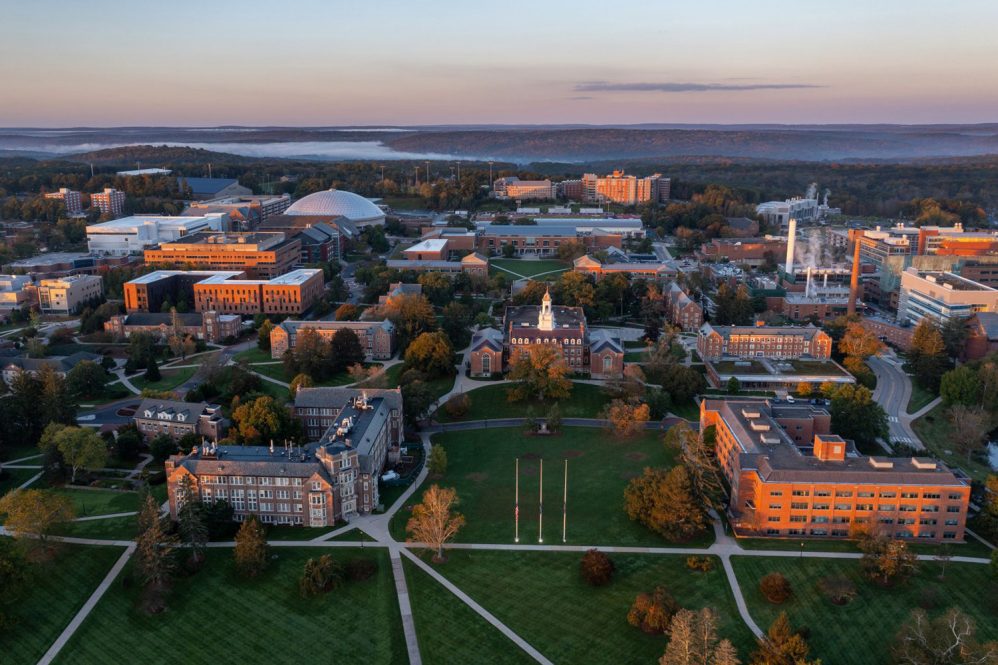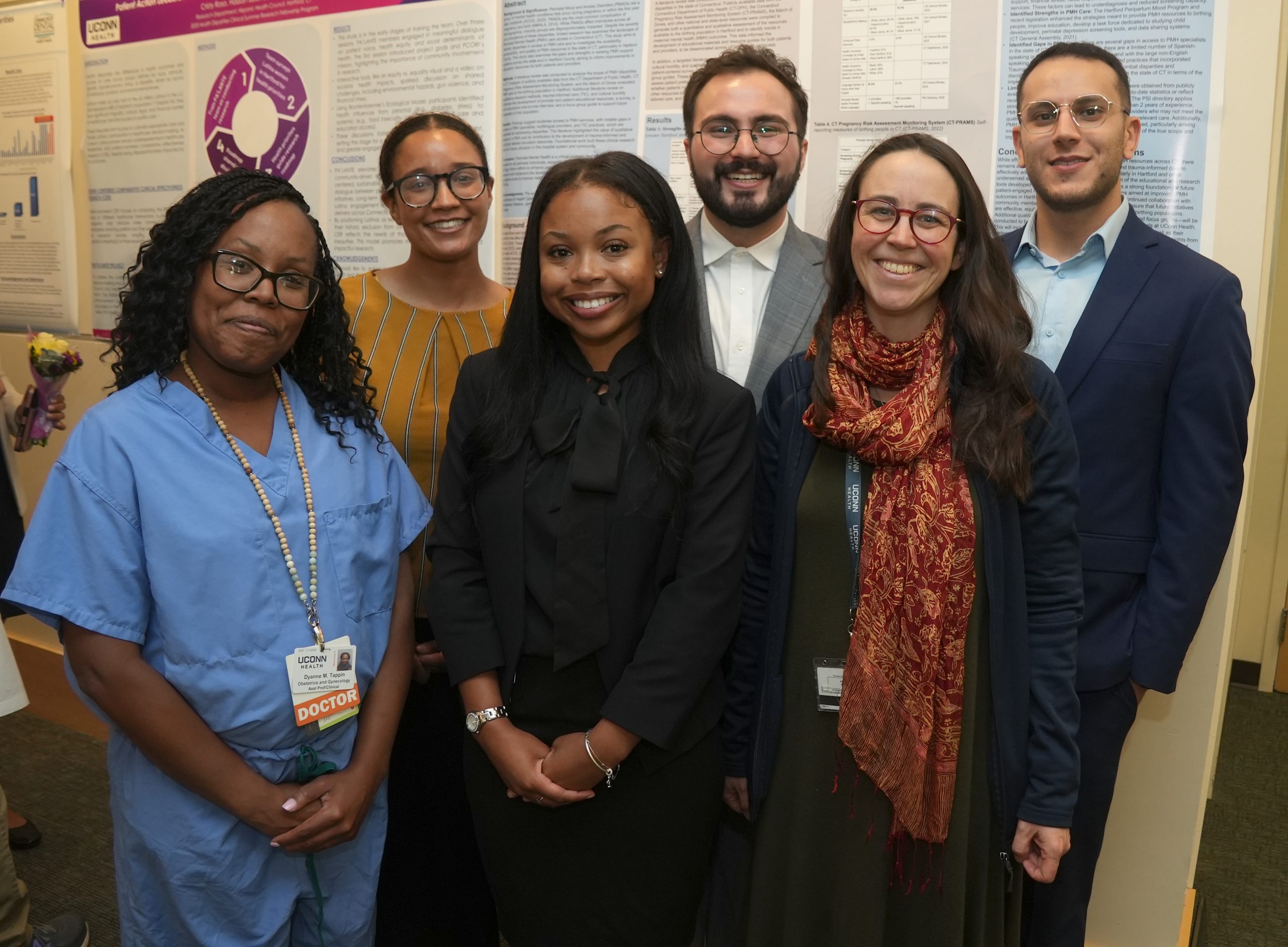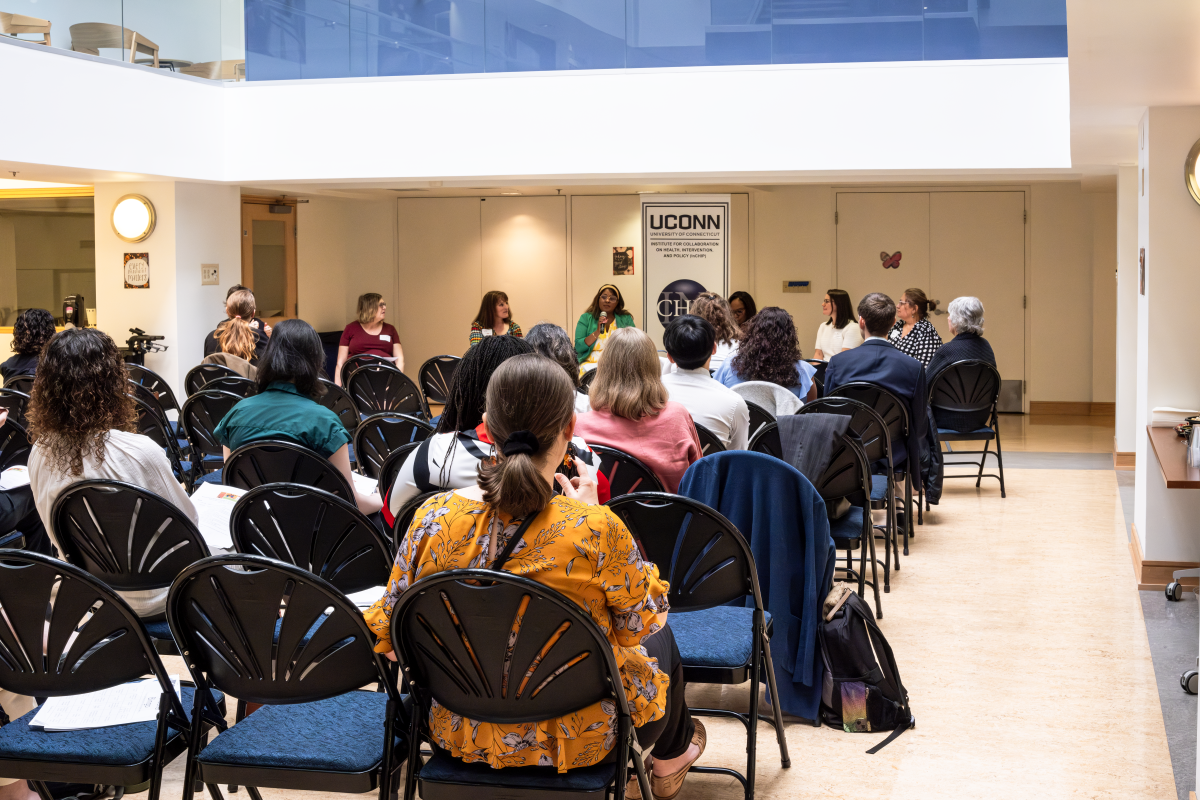Had Patrick Murphy ’24 (CLAS) gone to college for paleontology, he not only would have had to leave home, he also would have had to travel far.
“There are very few places in the world that offer paleontology as a degree, and they’re usually in places near fossiliferous rocks, so students can work in the field,” he says. “I wasn’t especially interested in studying paleontology in an academic way and doing research. For me, it’s the educational aspect of paleontology. I want to be teaching people about these things, ideally in a museum setting.”

For the last 12 years, Murphy has been a museum educator at Dinosaur State Park, teaching young and old about the band of dilophosaurus that left behind well-preserved tracks through the Connecticut River Valley for today’s visitors to marvel.
When he can teach just one person just one thing about a prehistoric animal, it’s been a good day.
And if he could continue working there another 12 years he would, he says, but the job isn’t suited for an adult professional who’s looking for more than just seasonal, part-time work.
“I really like the museum setting, using fossils to form connections and helping people with a hands-on activity. That’s when people invest and care about the things you’re teaching them,” he says. “I’d really love to do what I do at Dinosaur State Park somewhere I could do it full time.”
But finding a university with a major tailored to dinosaurs and museum education to prepare him for that future proved challenging, Murphy says.
Enter UConn’s Individualized and Interdisciplinary Studies Program (IISP) and his self-designed major – paleontology as outreach and education.
“It might seem daunting, the idea of creating your own major, but they really give you the support you need,” he says. “You get the benefit of choosing the classes that fit what you want to do, which means you’re more interested and invested in the classes you’re taking.”
Plus, living in Manchester and going to UConn meant Murphy didn’t have to traverse the globe in the same way dilophosaurus did through Rocky Hill.
Creating a program and drawing students
UConn’s IISP might have been officially declared in 1974 – making this year its 50th anniversary – but nearly a decade prior, students began clamoring for, and the University established, several interdisciplinary centers that provided a way for students to study subjects outside traditional academic paths, says IISP Director Kenneth Cormier ’91 (CLAS), ’03 MA ’10 Ph.D.
In 1969, UConn’s Experimental College offered short, noncredit classes directed by students and community members, and The Inner College became part of the 1969-70 school year, bringing independent studies, field experiences, and integrative workshops to a select group of students.
The Center for Educational Innovation, established in 1973, gave a place for the new Individualized Major Program in 1974, where it stayed until the 1990s when the program shifted under the auspices of several other centers, schools, and offices before attaching to Enrichment Programs, where it lives today.
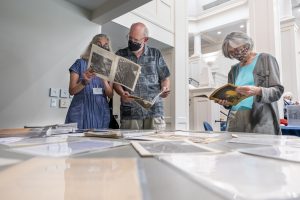
With about 50 students admitted to the program annually and about 120 on the path to graduation, each following a program of studies unique to them and their needs, Cormier says students are united in one thing: UConn’s existing catalog of majors didn’t quite fit what they wanted out of college.
“It’s a cohort in a way, but not like English or political science majors who might see the same people in classes and share the same discipline,” Cormier says. “Our students couldn’t quite find what they wanted to do here, so they created it, and by doing that they took ownership of their education.”
Many IISP students start in the program after noticing employment, lifestyle, and cultural changes and trends that require an integrated program of study that pieces together parts of several majors.
Others say they like a particular major, but not all aspects of it, and a different discipline, or even two or three different disciplines, would fit the part they want removed.
Some already were taking cohesive and similar class electives that could be merged into a second, albeit individualized, major.
And still there are others, Cormier says, who are facing academic challenges because they’re studying something they don’t really like or aren’t good at. Maybe they just haven’t yet found a discipline that resonates with them.
“Maybe they’re confused about what major they want to do and they’re at the end of their sophomore year, still working with ACES advisors to find something that works. Students will come to us sometimes in crisis mode, then once they start working with us, very often, you’ll see them completely turn around academically,” he says.
Majors as varied as the students
What does a global business and health innovation; government, policymaking, and law; and visual media major all have in common? They’re all students in IISP.
Cormier says many students piece together an individualized major in something health-related, like global health and social inequities. But majors in international affairs, creative writing and film, computational neuroscience, exercise and nutrition, and visual storytelling for children all have been designed.
The Department of Communication often becomes an important part of an individualized program, he adds, because it offers classes on how to talk with people, explain complicated material, and convey information, which can easily match with any other subject – how to talk about sports, how to explain biology, how to teach paleontology.
“Some students will ask me how an individualized major is going to look to others after graduation and the answer is it depends,” Cormier says. “Their degree is going to be from an accredited institution but some individualized majors, like global studies, are more familiar to the outside world.”
A UConn Avery Point student graduated last year with a major in marine resource management and Indigenous peoples because they want to do policy work on behalf of Native American communities, which means, Cormier says, the specificity of the major depends on the person.
Some unique majors have become outright programs
“I don’t have a favorite dinosaur. What I like about dinosaurs is the fact that there are so many different kinds of them. The smallest is literally this big,” Murphy says, forming his finger into a circle the size of a half dollar. “The biggest ones are over 140 feet long and weigh 80 to 100 tons. They come in all different shapes with an assortment of crests and frills, spikes and spines. The fact there are so many different kinds is what draws me to them.”
“For Patrick and paleontology, when he explains what he’s interested in, what he’s doing currently, and what he wants to do, his major just makes sense,” Cormier says. “It’s an interesting concept to take a discipline and learn how to connect with people through it. In his case it was paleontology as outreach and education, but it could be any subject.”
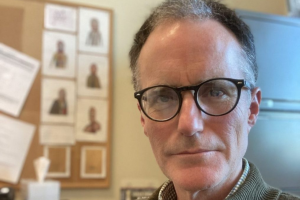
Through the decades, Cormier explains, individualized studies in women’s studies, Latin American Studies, human rights, data science, and others, have gained enough popularity – note the changes in lifestyle, employment, and culture over the last 50 years – to become outright majors.
At one point, though, students were forging their own ways in these subjects, piecemealing together classes from various departments. Cormier says he’s heard the IISP referred to as an “incubator” and that is one of its roles.
Undergraduates apply to the program at the earliest in their sophomore year or at the latest the spring of their junior year and enroll in what’s dubbed the “gateway course” to put together an interdisciplinary plan of study. In class, they also start the application process, Cormier says, and write a statement of purpose, or a rationale for their proposed major.
A faculty committee reviews the plan to make sure it doesn’t match an existing major, is feasible to complete, and that it includes 36 credits, 18 of which are from the degree-granting college. Students also need to have at least three academic advisors from the various departments that touch their major.
In Murphy’s case, he assembled faculty support from the departments of Communication, Psychological Sciences, Earth Sciences, and Ecology and Evolutionary Biology and gives props to Andy Bush from earth sciences, who not only taught him paleobiology but also served as his primary advisor.
Right now, the College of Liberal Arts and Sciences and College of Agriculture, Health and Natural Resources are the only two colleges that can grant individualized major degrees, Cormier says.
Students can take classes in other schools and colleges, but for someone who wants an individualized major in music and business, for instance, another discipline from CLAS or CAHNR must be brought in.
That takes cooperation among departments, schools, faculty, and staff – things, Cormier notes, that are essential to the success of the program.
Cormier’s own work has been interdisciplinary
IISP students are required to take a second W class, take a research methods course, and complete some kind of capstone project. Cormier says that right now he has students doing projects on the history of land surveying, incarcerated women, and the reunification of Ireland. Another student is writing a screenplay.
“One of the things we’re thinking about now is how to reach out and create community within the individualized major program,” Cormier says. “We need to keep the program healthy and get the word out about it, but we also need to build a community of people. It’s challenging because we’re not in a single building or even have a set of courses that everyone can feel bound by. But I do think there’s something that connects these students.”
Other than the gateway course and capstone project, that thing could be gratitude.
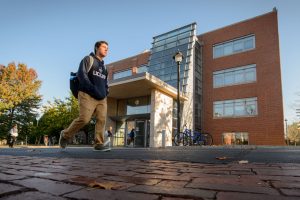
Since coming on as director in 2022, Cormier says he’s gotten numerous emails thanking him for his help and saying he made a difference. It’s not exactly an act he’s unfamiliar with, but one that’s become especially meaningful.
Cormier left a tenured faculty position in the English department at Quinnipiac University about 18 months ago to come to UConn, where he’s a three-time Husky. His own studies span disciplines, he says, and centered in his dissertation on the interaction between audio technology, audio recording technology, and different forms of creative writing.
In his days as a UConn student, he gained experience at WHUS where he produced a literary journal for radio and still maintains contacts there, giving him the advantage when he recently approached the station with an idea for a new podcast.
In “Indie Major,” Cormier sits with students for a 15-minute episode on their experience, their major, and the program. He gives each the same set of questions, but lets the conversations move naturally.
“It’s a resource that we direct our current students and prospective students to,” he says. “We tell them they should listen to a specific episode because it matches their interests. They can hear from students about what it’s like to put together classes, and it acts as a promotional tool.”
But the way he describes his own draw to higher education – for school and career – might also serve as a suitable advertisement.
“In higher education, I always loved the idea that you can go over to this building and find people talking about psychology, over in this one they’re talking about English, and over here they’re talking about marine biology. I always thought, ‘What an amazing place, where you can have people exchanging ideas, interacting, and working together,’” Cormier says. “In my job now, where I’m helping students tap into that ideal of a university, I’m so excited to facilitate that exchange of ideas.”
